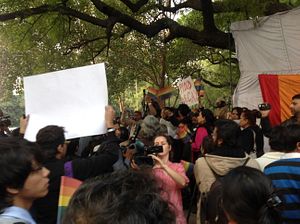Raveena and Rohit stood quietly at one corner of the protest venue, unlike their other friends who shouted slogans. Some of Rohit’s friends tried to coax them to join the chorus but they were not keen to join them. Their mood on Wednesday evening was completely transformed from that morning when they were on the Supreme Court’s lawn in New Delhi, where they were involved in an animated conversation with other gay and lesbian activists waiting for the landmark verdict from the apex court on whether Section 377 criminalizes same sex alliances or not.
But the highest court’s judgement on Wednesday morning, that gay sex would remain illegal in India, came as a huge setback for Raveena and Rohit who were planning to legalize their relationship. The Supreme Court overturned a four-year-old judgement of the Delhi High Court that legalized same-sex marriage in 2009. With new decision India has once again criminalized gay sex under Section 377. The verdict means that Raveena and Rohit as well as many others cannot think of settling down as a couple and if they do so they might be sent to jail for ten years and possibly for life in some cases.
The court left the decision to abolish or alter Section 377 to the wisdom of India’s legislators.
“With the verdict, our relationship not only becomes suspect but criminal in the eyes of the law. Suddenly the apex court, which is the guardian of freedom of expression and liberty, has made our existence illegal and taken away whatever liberty and freedom we used to have. It’s a very sad day in my life. I didn’t feel that devastated when my family threw me out for my orientation few years ago. The court has really orphaned me and deeply saddened me,” says Raveena.
Immediately after the verdict the gay community in Delhi held a press conference and condemned the “inhuman” and “unconstitutional” decision of the court.
Speaking with The Diplomat, Anand Grover, senior counsel who fought the case on behalf of the sexual minority said that “the judgement is very disappointing. It took the Supreme Court 21 months to tell the lesbian, gay, bisexual and transgender (LGBT) community that they are criminals in the eyes of the law. The movement for LGBT equality is unstoppable. We will be filing a review of the decision soon in the court.”
The anger and frustration spilled over onto the streets by the evening. Not only did the LGBT community turn up in substantial numbers but also several women right’s activists came to express solidarity with the community.
“The judgement has taken us several decades back. The feminist movement is fighting against exclusion, patriarchy,
Despite the broad criticisms, the religious leaders who were petitioners in the case welcomed the verdict.
In an interview with The Diplomat, the yoga guru, Ramdev, who has been a vocal critic of the High Court order in 2009, said that “same sex unions are unethical,unscientific,
But if one goes by media reports and reactions, the overwhelming majority of Indians have been very critical of the court’s ruling. The ruling has been dominating the headlines and a majority of editorials have questioned the wisdom of the Supreme Court in this landmark judgement. Calling the ruling a “betrayal,” the Indian Express writes that the “Supreme Court has thrown away the opportunity to defend sexual freedom, uphold human rights. It is simply the refusal to extend constitutional protections to some Indian citizens, on the basis of their sexual activity.”
The Hindu called it “a retrograde decision” and writes that the verdict has “enthroned medieval prejudice and dealt a body blow to liberal values and human rights.”
For the first time, some political parties have come out in support of gay rights in India. The ruling Congress has decried the SC’s mandate and termed the decision unfortunate. The top leadership of the party, led by its president Sonia Gandhi, said that “Parliament will address the issue and uphold the Constitutional guarantee of life and liberty to all citizens.” Similar sentiments have been expressed by Rahul Gandhi, the Vice President and prime ministerial candidate of the party. Criticizing the judgement, he said that “the country is known for freedom of expression.”
Some news reports suggest that the government is planning to bring an ordinance soon to abrogate Section 377, a colonial-era law passed in 1860. But in a fractured polity, where the Hindu right-wing Bhartiya Janata Party is on an upswing, gaining parliamentary approval to reverse this landmark change will not be that easy.
Ravenna and Rohit are concerned about their future, but they are not afraid. “It was not possible to get public support on this issue with the same vigour as is happening now. We don’t intend to go underground. We will defy the system and live together,” says Rohit.
































